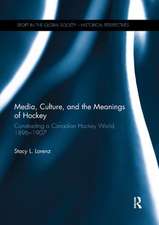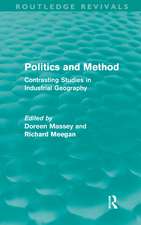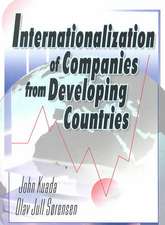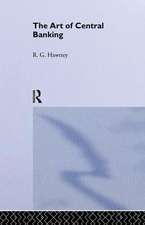Worldwide Knowledge?: Global Firms, Local Labour and the Region: Economic Geography Series
Autor Martina Fuchsen Limba Engleză Paperback – 12 feb 2018
| Toate formatele și edițiile | Preț | Express |
|---|---|---|
| Paperback (1) | 449.41 lei 6-8 săpt. | |
| Taylor & Francis – 12 feb 2018 | 449.41 lei 6-8 săpt. | |
| Hardback (1) | 1053.95 lei 6-8 săpt. | |
| Taylor & Francis – 11 dec 2014 | 1053.95 lei 6-8 săpt. |
Preț: 449.41 lei
Nou
Puncte Express: 674
Preț estimativ în valută:
85.100€ • 91.96$ • 71.70£
85.100€ • 91.96$ • 71.70£
Carte tipărită la comandă
Livrare economică 18 aprilie-02 mai
Preluare comenzi: 021 569.72.76
Specificații
ISBN-13: 9781138546578
ISBN-10: 1138546577
Pagini: 180
Dimensiuni: 156 x 234 x 10 mm
Greutate: 0.45 kg
Ediția:1
Editura: Taylor & Francis
Colecția Routledge
Seria Economic Geography Series
Locul publicării:Oxford, United Kingdom
ISBN-10: 1138546577
Pagini: 180
Dimensiuni: 156 x 234 x 10 mm
Greutate: 0.45 kg
Ediția:1
Editura: Taylor & Francis
Colecția Routledge
Seria Economic Geography Series
Locul publicării:Oxford, United Kingdom
Cuprins
Contents: Preface. Part I Introduction: Worldwide knowledge? Global firms, local labour and the region. Part II Knowledge: Conceptual Deliberations: Knowledge in the global economy; Scientific-technical knowledge and the knowledge-based society; Beyond scientific-technical knowledge; Beyond knowledge: the relevance of interpretation; Knowledge and interpretation in temporal dynamics: learning; Knowledge and interpretation in place and space; Interim conclusion. Part III Globalisation of Knowledge in R&D and Production - Empirical Insights: Studies on the globalisation of knowledge: methodological introduction; Empirical evidence for the 'star of knowledge and interpretation'; Globalisation of scientific-technical, R&D-related knowledge; Globalisation of production-related knowledge; Impacts on the North: globalisation of knowledge as a race to the bottom or industrial transition with new arrangements worldwide; Summary and discussion. References; Index.
Notă biografică
Martina Fuchs is Professor at the Department of Economic and Social Geography, Faculty of Economics and Social Sciences, University of Cologne, Germany.
Recenzii
’Putting the global proliferation of knowledge, interpretation, learning and expertise centre stage, this book offers novel and illuminative perspectives even to experts of globalisation. Some of the most intangible and elusive concomitants of internationalised production are exposed, which reveals how rising producers in the Southern periphery challenge the powers of maturing industries in the North.’ Martina Fromhold-Eisebith, RWTH Aachen University, Germany ’The rapid dispersion of production-related knowledge to places outside the core economies has become an important feature in the accelerating process of globalization. At the same time research and development activities by multinational companies are increasingly being located in previously peripheral regions. Martina Fuchs has produced a timely and insightful account of this fascinating process, accompanied by well-chosen, illustrative empirical examples from different parts of the world.’ Claes G. Alvstam, University of Gothenburg, Sweden ’With the persistent internationalization of business, what is happening to the knowledge necessary to manage and upgrade corporate operations? This book is a stimulating invitation to participate in drawing the complex, evolving map of corporate knowledge in the global economy. Martina Fuchs proposes a multidimensional account of knowledge and interpretation to suggest that its global dynamics eschew any simple North-South divisions and its creation and use are more entwined with local circumstances.’ Päivi Oinas, Turku School of Economics, University of Turku, Finland
Descriere
Putting forward a comprehensive view of knowledge with a specific perspective on place and space, this book provides a new perspective on the globalisation of knowledge. Crossing disciplinary boundaries, the principal agenda of this volume is to open up a perspective ’beyond knowledge’- i.e. beyond the interpretation of knowledge as scientific-technical knowledge. It also introduces further kinds of knowledge and interpretation which influence managements’ perception of globalisation and therefore the knowledge which is going global. Exploring beyond the meaning of worldwide knowledge as general open access knowledge, this book also discusses barriers to knowledge, problems of transfer, and the influence of governance and control.





















